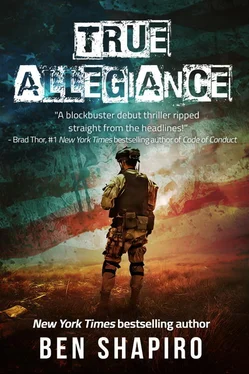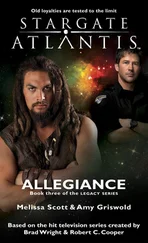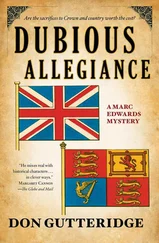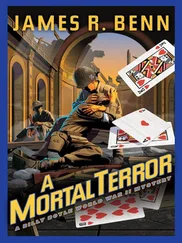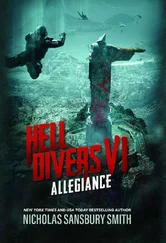He stumbled forward toward the gates as he reached the empty field. The gates grew larger with every agonizing step.
Then, miraculously, the gate was before him. Brett grinned as it materialized in the darkness.
Except that the gate was open.
Blown wide open.
Then he saw it. To the northwest, something was burning. The acrid smoke of burning oil and flesh cut his nostrils. He wiped the sweat off his face and walked toward the helicopter. My God , he thought. There is no last helicopter .
He knew before he reached the helicopter what had happened. The smoke billowed in great black plumes against the blue-black night sky; the soft, angry flames spurted from the landing gear. The runway was clear except for the helicopter and the dozens of uniformed corpses lying nearby. Brett knew some of the corpses—they had been his men at the embassy. Many had been shot at point-blank range in the head.
Obviously, the Taliban had taken the airport, and they’d been ready and waiting when the ambassador’s chopper arrived. A massive, coordinated assault. The Tet Offensive, except successful in every way.
The Taliban had waited for the helicopter to land, and then they’d shot it to pieces and executed the survivors.
“Son of a bitch,” Brett muttered to himself.
Brett glanced at the horizon. The sun would be up soon, and the uniform would be a target. The field would soon be swarming with Taliban allies. He had to find a place to hole up and think.
The only place in sight was a nearby hangar, one of the military’s famous steel made-to-order jobs. Brett didn’t know whether it was occupied, but at this point, he didn’t care—he felt a wild anger rising in him. He instinctively gripped his pistol tighter.
He made for the hangar. Even before he stepped inside, he could smell the death there. The horror when he did enter made him step outside again. The nausea felt hard and cold on his stomach. He shook it off, his head thickening.
Then he went in.
Blood covered the floor, the walls. It slicked the floor like oil at a transmission shop. The Taliban had used the hangar as an execution post, and there was a line of bodies lying on the floor, many of them wearing American uniforms. Those bodies had been mutilated obscenely, despicably. Limbs and organs were missing, flesh burned. They’d done it slowly. They’d enjoyed themselves. There couldn’t be any other explanation.
“Animals,” he said softly. “Fuck these animals.”
One of the bodies looked familiar—the last body in line. It wore an expensive, carefully tailored suit. The face was unrecognizable. One of the hands was missing. Brett ripped the jacket off the corpse and looked at the inside lining. Embroidered on the inside of the jacket were three letters: B.F.F. Brett knew right away: it was Beauregard Frederick Feldkauf. The ambassador hadn’t made it out after all.
For some reason, that small measure of justice made Brett feel just slightly better for a moment. Then he realized the enormity of the situation, the enormity of the loss.
It had all been for nothing. The staffer who had bled out on the roof. The servicemen and women who had died in the alleyways. The whole damn operation up in flames. And they hadn’t even been able to successfully evacuate the ambassador.
He didn’t have time to mourn—and he wouldn’t have even if he did. Feldkauf, after all, was an asshole. His first order of business had to be setting his arm to prevent infection. Then he’d figure out what to do.
He looked around for materials to dress the wound, spotted a first aid kit still hanging on the wall. It would do for the gunshot wound. At least he’d live until morning.
But he still needed to set the arm. He didn’t know how to do it. All he knew was that his arm was sticking out at a peculiar angle, and that he needed to fix that. As far as he could tell, there was no internal bleeding—the arm was swollen, but it wasn’t bulging. But if he left the broken bone hanging around inside, it would cut an artery sooner or later.
Brett backed himself up until he was about two feet from one of the walls. Then he gripped his upper arm tightly, took a deep breath, and smashed his hand against the wall. The pain shot up his arm like a thunderbolt, making him gasp; involuntarily he screamed. Before he could think about it again, he smashed his hand into the wall again—this time, he heard the arm crack back into place. He lay back on the floor, his chest heaving, his stomach cold with sweat, tears of pain in his eyes.
Now , he thought, let’s stabilize this son of a bitch .
He’d seen temporary splints before. All he needed was two straight sticks to place on either side of his arm and some cloth to tie them in place. The cloth wasn’t hard to come by. The rods were.
Brett scooted around the floor on his butt, looking around for something that could serve the basic purpose. The Taliban had done a thorough job of cleaning the place out—they had made their living from scavenging for so long that they were sure to take everything of value. He’d been lucky just to find the first aid kit.
Half an hour later, he was still looking. He hadn’t eaten or drunk in twelve hours, and he’d suffered a gunshot wound and a broken arm. His body was crying out for sleep, for reprieve, for any sort of relief.
Then he spotted it, gleaming dully in the dark structure.
Feldkauf’s briefcase, still connected to his corpse. He clawed at the floor with both hands, the energy flowing through his veins. It was an old-school pop-top briefcase, a black leather piece with steel ringing the inside in strips. It had a combination lock on the front with three digits.
Brett tried the combination already in place. Nothing.
He sat for a moment, thinking. Then he tried the only thing he could think of: 266. B.F.F.
Miraculously, it popped open.
A Glock. A passport. Stacks of afghanis, stacks of dollars. A bag of a sticky, blackish substance—opium.
And a Xerox copy of a map, with two sets of coordinates. Longitude and latitude. 51.4231. 35.6961.
Iran.
41.440. 34.234.
Iraq.
Brett knew what it meant.
Brett had known of the CIA’s discovery of weapons of mass destruction in Iraq for years. Everyone on the inside had known. The media had reported that the government had lied, that somehow, all the world’s greatest intelligence agencies had been dead wrong. But that wasn’t the case. Hussein had smuggled some of the weapons out of the country to Syria; others had been buried in the desert.
Beneath those coordinates.
And now they were in Iran.
Thanks to Ambassador Beauregard Frederick Feldkauf.
“Feldkauf, you son of a bitch,” Brett muttered. “You sold us out.”
Then he passed out.
President Prescott

Washington, DC
“AT FIRST, THE NUMBERS DIDN’T make sense to me either, Mr. President,” the young analyst explained. “The airlines have been doing well this year. This precipitous stock drop doesn’t make sense. Yeah, some of their balance sheets could be a bit stronger, but there’s nothing to indicate a recession coming.”
Prescott looked at the nerd. He hated beating around the bush, and this guy with the knockoff suit from Joseph A. Bank and the pocket protector was doing just that. He seemed self-assured—self-assured as most cranks were. Prescott had never heard of him. But with General Bill Collier sitting right there, Prescott couldn’t just blow this irritating asshole off. He had to at least appear interested.
Читать дальше
